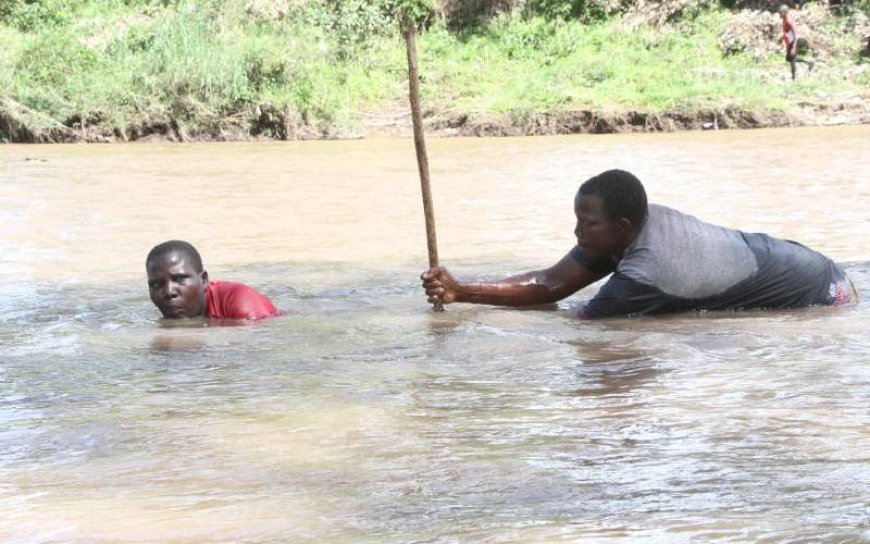Migori Sand Harvesters Face Multiple Risks from Aquatic Life

Migori, Friday June 9, 2023
KNA By Ochuodho Elkana/Obuoyo Michael
From Migori to Kisumu to Nairobi, the world’s cities are built from sand - massive amounts of sand. It’s in the cement and concrete that makes the bulk of most buildings. The glass in those buildings’ windows is made with sand, too. So is the tarmac laid onto the roads around them.
According to a recent report by the United Nations Environment Programme (UNEP), sand is the second-largest exploited resource after water, with 50 billion tons extracted from lakes, riverbeds, coastlines and deltas each year.
The sand that’s ideally sized, shaped and cut out for construction comes from shorelines and the beds of rivers and lakes. This is also where to find silica sand, which is melted down to make glass for everything from windshields to smartphone screens.
However, harvesting this sand from the beds of the river is a very risky and a perilous exercise as it requires one to be more courageous, determined and hardworking to access the prized commodity - huge sand deposits that lies in the brown waters infested with dangerous reptiles such as crocodile,
Mr David Otieno, a sand harvester at River Migori in Suna East constituency, says that sand harvesting in the region has been a lifeline to many residents in the area especially those who border the river.
Otieno says that he was raised in a family where both of his parents were sand harvesters and being that sand harvesting was the source of income to their family, at 12years old he joined his parents in helping them to carry harvested sand from the banks of the rivers to the collection points.
He reveals that sand harvesting needs a skill to identify where the huge deposits lie, it requires someone with experience to distinguish which areas have large deposits from the areas with less deposits.
Mr David Ochieng’, another sand miner in river Migori, confides that when any sand harvester sets out to scoop sand from river Migori waters every morning, what always comes first in his mid is the bundles of notes he stands to make by the end of the day from buyers who throng their sites near the Migori town bridge.
It never downs on them the many risks they face when they plunge into the deep waters to harvest sand from the hippo, crocodile and snake infested river.
A part from the dangerous reptiles, Ochieng’ and his many colleagues in the sand harvesting business are also threatened by dozens of aquatic life such as snails, amoebic and typhoid pests that swim freely in the river.
They are also prone to the danger of drowning while looking for this precious mineral that has become their sole economic mainstay amid rising demands in the market.
But the sand miners have now been forced to employ protective tactics to ward off the dangers of crocodile/hippos attacks and snake bites that have been on the rise unabated for a long period of time at their place of work.
“To protect ourselves from the roaming snakes, the wild hippos and crocodiles, we usually make special long spades that we use to scoop the sand and at the same use them as weapons to fight these reptiles.
"Our spades underwent a remarkable transformation. We turned them into formidable weapons that have shielded us from harm and ensured our safety," Ochieng’ explained when KNA visited him at his work place recently.
The miners would always unleash their mighty spades on the beasts when they attack them. In one occasion, Ochieng’ almost died when he came face to face with a wild black mamba snake that tried to bite him.
"I once found myself staring at death when a huge black mamba emerged from the river banks gnashing its fangs and racing towards me. With my trusted spade, I thrashed the water vigorously until the creature retreated into the thick grass nearby," Ochieng shared, recalling the surprise encounter.
The Migori river sand harvesters also employ traditional rites in a bid to remain safe during their work of scooping this raw material from the deep river bed. They have refused to surrender to the many perils that await them in the muddy waters.
Besides the magical spades, the team also employs sacred rituals to wake up their great grand fathers’ good spirits to ensure their safety while scouring the unseen river bed to get sand that is allowing them to eke a living for their families.
“Intricate rituals unfold whenever a new harvesting site has been established, beginning with prayers for protection and guidance.
“We then burn used tires that emit heavy black smokes that are believed to form formidable barriers between the sand miners and possible lurking human threats.
The whole ritual would be crowned by casting or throwing a number of stones into the river water and, all these would symbolise our unwavering determination to overcome any obstacles, a symbolic act to drive away wild aquatic creatures and ensure safe working environment,” claimed Ochieng’.
But he elaborated that all their activities in the river water has also had the human face of conserving the environment and the wildlife within the water.
“While we go into the river largely to make income from the sale of sand, which earns us individual persons between Sh1,500 to Sh 3,000 a day, our focus is also not to kill the crocodiles and the hippos, but instead we choose only to scare them off.
Our approach is not to harm the animals, but to only intimidate and drive them away,” he revealed.
But the miners want the Kenya Wildlife Service and the government to patrol the river regularly and delve in relocating the wild animals, especial the crocodiles and hippos with a view to remedying the rising human wildlife conflict in the region.
Courtesy ; K. N. A
What's Your Reaction?
































































































































































































































































































